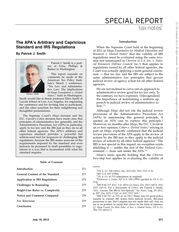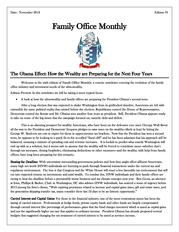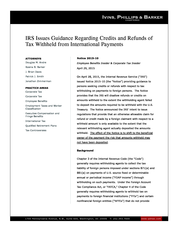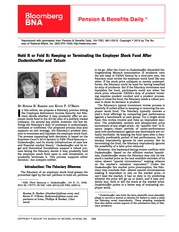Employee Benefits Update - Terminating the Employer Stock Fund: RJR Court Outlines Template for Prudent Process – March 2016
Ivins, Phillips & Barker, Chartered
Description
WHO WE ARE
IPB IN THE NEWS
Ivins, Phillips & Barker, Chartered
1700 Pennsylvania Ave. NW, Suite 600
Washington DC, 20006
(202) 393-7600
http://www.ipbtax.com
Robin Solomon and Jonathan
Zimmerman speak on 401(k) Fee
Litigation, Stock-Drop Litigation, and
Pension De-Risking (February 24,
2016)
Contact our Employee Benefits team at benefits@ipbtax.com
Rosina Barker invited to join the
American Benefits Council (“ABC”)
Policy Board of Directors
Ben Grosz quoted by Fiduciary News
on 401(k) fee litigation and plan
sponsor reaction (February 23, 2016)
Carroll Savage
Kevin O’Brien
Laurie Keenan
(202) 662-3405
(202) 662-3411
(202) 662-3461
csavage@ipbtax.com
kobrien@ipbtax.com
lkeenan@ipbtax.com
Steve Witmer
Rosina Barker
Will Sollee, Jr.
(310) 407-5460
(202) 662-3420
(202) 662-3466
switmer@ipbtax.com
rbarker@ipbtax.com
Jeannie Leahy*
Jodi Epstein
Robin Solomon
(202) 662-3414
(202) 662-3468
jepstein@ipbtax.com
rsolomon@ipbtax.com
Victor Chang
(202) 662-3462
Jonathan Zimmerman
(202) 662-3464
Spencer Walters
(202) 662-3459
vchang@ipbtax.com
jzimmerman@ipbtax.com swalters@ipbtax.com
Ben Grosz
(202) 662-3422
bgrosz@ipbtax.com
Percy Lee*
(202) 662-3458
plee@ipbtax.com
Ivins alum Robert Stack honored as
Tax Person of the Year for 2015. Mr.
Stack was appointed Deputy Assistant
Secretary of the Treasury for
International Tax Affairs in 2013.
Finalists also included Robert Wellen,
an Ivins alum who was appointed IRS
Associate Chief Counsel in May 2015.
(202) 662-3474
jleahy@ipbtax.com
Robin Solomon and Ben Grosz quoted
by U.S. News & World Report on TaxAdvantaged Employee and Fringe
Benefits (February 12, 2016)
wsollee@ipbtax.com
* Not admitted in the District of Columbia
Qualified Retirement Plans • Executive Compensation • Fringe
Benefits • Health and Welfare Plans • Plan Terminations and
Bankruptcy • Employment Taxes and Worker Classification
COMING SOON…
Jodi Epstein to present on Minimizing
401(k) Plan Litigation Risk at the
Defined Contribution Institutional
Investment Association (“DCIIA”)
public policy forum (April 5, 2016)
Ben Grosz to chair and moderate ABA
Business Law CLE program discussing
Employee Benefits topics; Steve
Witmer to speak as panelist
(April 28, 2016)
EB UPDATE ARCHIVES
January 2016 EB Update
.
Investor Relations Presentations
+
Investor Relations Sub Categories
Ivins, Phillips & Barker, Chartered













